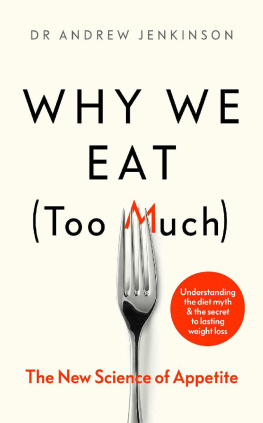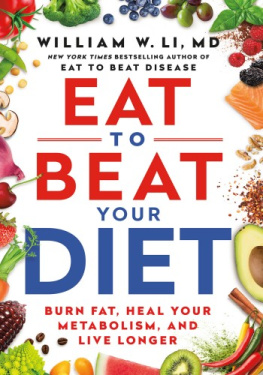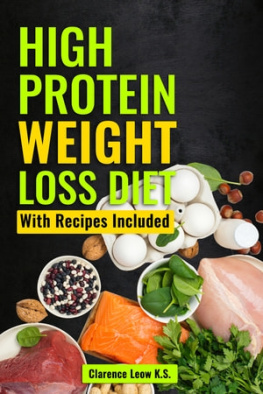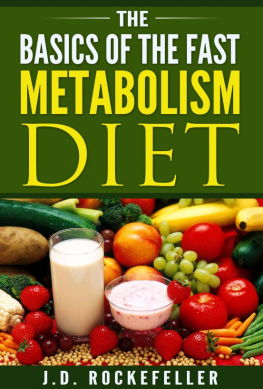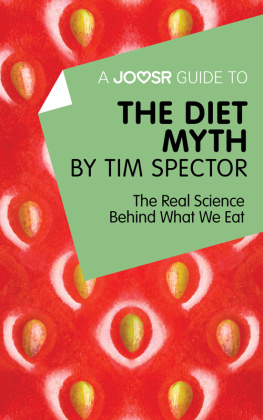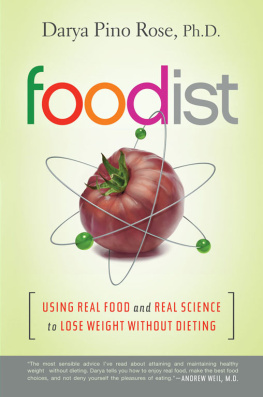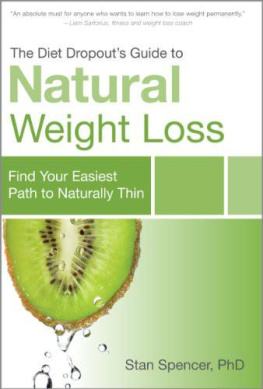
Dr Andrew Jenkinson
WHY WE EAT
(TOO MUCH)
The New Science of Appetite

Contents
- PART ONE: LESSONS IN ENERGY :
How Our Body Works to Control Weight - 1 : Metabology for Beginners :
How Our Weight is Controlled - 2 : The Sacred Cow :
How Genetics, Epigenetics and Food Control Our Weight Set-Point - 3 : Dieting and the Biggest Losers :
Why Our Metabolism Can Change Dramatically - 4 : Why We Eat :
How Our Appetite (and Satiety) Works - 5 : The Glutton :
Understanding the Fatness Hormone - 6 : The Last Resort :
How Weight-Loss Surgery Works
- PART TWO: LESSONS IN OBESOGENICS :
How Our Environment Determines Our Weight - 7 : The Master Chef :
Why Cooking Matters - 8 : The Heart of the Matter :
How Poor Nutritional Science Led to Bad Eating Habits - 9 : The Omega Code :
Is Obesity a Deficiency Disease? - 10 : The Sugar Roller Coaster :
Glucose, Insulin and Our Weight Set-Point - 11 : The French Paradox :
Saturated Fat, Nutritional Advice and Food Culture - 12 : The Miracle Diet Book :
Why You Should Stop Dieting - 13 : The Fat of the Land :
Life Events, Hormones, Geography and Your Weight
- PART THREE: BLUEPRINT FOR A HEALTHIER WEIGHT :
The Secret to Lasting Weight Loss - 14 : Prepare to Do It Yourself :
Preparing Your Home and Mind - 15 : Eat More, Rest More :
Lowering Insulin and Cortisol - 16 : Your Personal Blue Zone :
Improving Cell and Muscle Metabolism
About the Author
Dr Andrew Jenkinson is a consultant surgeon with a special interest in advanced laparoscopic, or keyhole surgery. He is part of an expert team developing advances in gastrointestinal (stomach and bowel) surgery at University College Hospital in Bloomsbury, central London.
List of Illustrations
Figures
Tables
Introduction
Bariatric Surgery Outpatients Clinic, London, December 2012
Clinic K is where people come to discuss having their stomach removed.
The office, occupying a whole corner of University College Hospitals first floor, has a backdrop of London through large floor-to-ceiling windows. Looking out onto the red buses and black cabs of Euston Road, I remember recognizing one of my patients slowly making her way over to the hospitals main entrance, sheltering her large body under a flapping umbrella in the storm, vainly trying to keep dry for her appointment. I felt sad for her.
Minutes later she entered, trepidation and despair etched on her face. She had finally given in, held up the white flag, surrendered in her battle with her weight she had lost the diet wars. She wanted me to remove most of her stomach. She eased herself into our over-sized clinic chair and tearfully recounted her years of dietary failure. And as she talked I listened and learned.
Why We Eat (Too Much) was inspired by patients just like this lady normal people who had suffered with their weight for years; people who came to me looking for treatment.
My patients encouraged me to write this book. I had listened to them over the years and what they said did not fit with my own understanding of obesity. I wanted to close this gap between what scientists, doctors and dieticians told us about it, and how to deal with it, and what obese people actually experienced because the two stories did not fit together. Someone had got it wrong.
If, as the scientists told us, it was simple to lose weight by dieting and exercise, and if the benefits of that weight loss were so great in terms of happiness, confidence, health and finances, then why could people not achieve it? Over the next five years I became intrigued by this question: why something seemingly so simple could in practice prove to be so difficult. Why cant people sustain weight loss? How could weight loss through dieting be so difficult that people resorted to such extreme measures as stomach-removal (or bypassing) surgery?
University College London Hospital (UCLH) has a fantastic metabolic research unit, run by my colleague Professor Rachel Batterham. Her cutting-edge research gave me a head-start in understanding how our appetite is controlled by strong hormones (originating in the stomach and intestines) that have a profound effect on what we eat and how much we eat. Appetite did not seem to be under a great deal of conscious control; instead, it was governed by these newly discovered hormones.
My studies took me from appetite on to metabolism. How is the amount of energy that we burn controlled? More hormones seemed to be involved. But, curiously, much of the ground-breaking research that explained our metabolism was being ignored by mainstream medicine. Why was this?
If our appetite and our metabolism are being controlled by powerful hormones, then this would explain why it is so difficult for my patients to lose weight using simple willpower. The hormonal triggers that drive our eating and resting behaviour seem to be mainly influenced by our changing environment.
In this book, I will use the newly emerging scientific understanding of metabolism and appetite and combine this knowledge with what obese people have been trying to tell us for years. I will explain why most of the things that you have been told about obesity are myths, based on poor research and vested interests. I will explain:
- Why it is so difficult to lose weight if you use the current advice from medical and nutritional experts
- How some of this dietary advice can be counter-productive and make weight loss even more difficult
- The best strategies for long-term weight loss and health, whether you want to lose 5lb or 5 stone
- Why many very obese people have the feeling that they are trapped and cannot escape, no matter how hard they try.
Once you have read this book you should have a better understanding of why medical professionals have been failing in their advice on weight loss for so many years and, more importantly, you will be able to use this knowledge to improve your own health and wellbeing. By the end of this book I hope that you will feel a sense of relief that, finally, you have not only an explanation, but also a solution. I will avoid excessive medical jargon (and explain any terms that need to be used) and present my ideas in an accessible (sometimes light-hearted) way to keep you reading.
But first, some background. I am a surgeon at University College Hospital in London. My job is to treat people who cannot lose weight by dieting and have reached the end of the road. They have accepted that for them it is impossible to lose weight and keep that weight off. They know that unless something drastic is done they will spend their lives feeling trapped beneath layers of fat, slowly getting sicker and more frustrated and unhappy. In the last fifteen years I must have interviewed over 2,000 people in this situation.
The solution my patients seek is surgery. Not surgery like liposuction to suck out the fat, but an operation that will change their stomach and intestines to make it easier for them to lose weight: bariatric surgery. You may have heard about this type of surgery in the media. A popular bariatric operation is the gastric band. This entails having an adjustable band (made of a type of plastic) placed around the upper part of the stomach. The band works by stopping you eating very fast making you feel full (and sometimes uncomfortable) after a very small meal. The gastric band has now been overtaken in popularity by two other procedures: one where the stomach is completely bypassed (so food doesnt ever see the stomach), and another where three quarters of the stomach is completely removed, leaving what remains in the shape and size of a narrow tube. This is called the sleeve gastrectomy (more on this in ).
Next page
